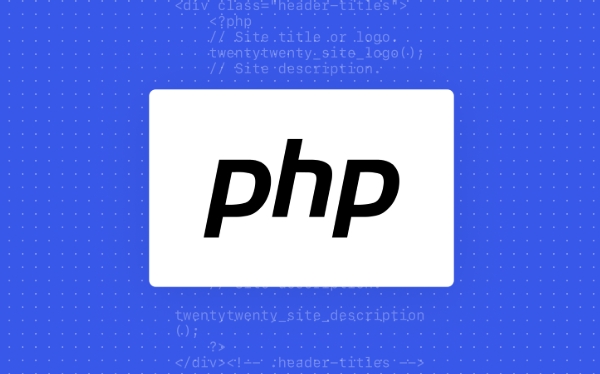What is the maximum data size you can store in a PHP session?
Jul 12, 2025 am 01:49 AMPHP sessions have no strict size limit, but storing large data can cause performance and memory issues. 1. Default file-based storage slows down with large session data due to locking. 2. Large sessions increase memory usage and risk hitting memory limits. 3. Use scalable handlers like Redis for high concurrency. 4. Store only essential data and clean up regularly to avoid bottlenecks.

PHP sessions are a common way to store user-specific data across requests, but they do have limitations—especially when it comes to how much data you can store.

There’s no strict built-in limit on the size of session data in PHP itself, but practical limits come from server configuration and performance considerations. In general, you should keep session data relatively small, ideally under a few hundred kilobytes at most.
Here's what you really need to know:

Session Storage Mechanism Affects Performance
By default, PHP stores session data in files on the server. Each session gets its own file, and that file is locked during the request to prevent race conditions. If you store large amounts of data in the session, especially serialized arrays or big objects, this file can become slow to read and write.
- Larger session data means longer lock times
- This can cause bottlenecks under heavy traffic
- Consider switching to a more scalable handler like Redis or Memcached if you're dealing with high concurrency
So while there’s no hard cap, storing too much can hurt your site's performance even if it technically "works."

No Hard Limit, But Watch for Memory Usage
PHP scripts have memory limits (defined by memory_limit in php.ini), and large session data contributes to that usage.
- Serializing and unserializing large session data uses memory
- If you’re storing big arrays or objects in
$_SESSION, you might hit memory issues faster than storage issues - Use
memory_get_usage()to test how session data affects script memory
If you're seeing out-of-memory errors after enabling sessions, it may not be due to code directly, but rather what's stored in the session.
Practical Advice: Keep Sessions Lean
Storing massive chunks of data in sessions is generally discouraged. Here’s what to do instead:
- Store only essential data — like user ID, login status, or basic preferences
- Avoid caching large datasets in sessions; use a database or cache system instead
- Clean up old or unused session data regularly using
unset($_SESSION['key'])
For example, instead of saving an entire shopping cart array with full product details, just save product IDs and quantities. You can fetch the rest from the database when needed.
In short, PHP won’t stop you from stuffing megabytes into a session, but doing so can lead to slower performance and memory problems. It's best to treat session storage as a lightweight tool for maintaining state—not a general-purpose cache or database.
That’s basically it. Not a strict number, but definitely something to manage carefully.
The above is the detailed content of What is the maximum data size you can store in a PHP session?. For more information, please follow other related articles on the PHP Chinese website!

Hot AI Tools

Undress AI Tool
Undress images for free

Undresser.AI Undress
AI-powered app for creating realistic nude photos

AI Clothes Remover
Online AI tool for removing clothes from photos.

Clothoff.io
AI clothes remover

Video Face Swap
Swap faces in any video effortlessly with our completely free AI face swap tool!

Hot Article

Hot Tools

Notepad++7.3.1
Easy-to-use and free code editor

SublimeText3 Chinese version
Chinese version, very easy to use

Zend Studio 13.0.1
Powerful PHP integrated development environment

Dreamweaver CS6
Visual web development tools

SublimeText3 Mac version
God-level code editing software (SublimeText3)
 PHP Variable Scope Explained
Jul 17, 2025 am 04:16 AM
PHP Variable Scope Explained
Jul 17, 2025 am 04:16 AM
Common problems and solutions for PHP variable scope include: 1. The global variable cannot be accessed within the function, and it needs to be passed in using the global keyword or parameter; 2. The static variable is declared with static, and it is only initialized once and the value is maintained between multiple calls; 3. Hyperglobal variables such as $_GET and $_POST can be used directly in any scope, but you need to pay attention to safe filtering; 4. Anonymous functions need to introduce parent scope variables through the use keyword, and when modifying external variables, you need to pass a reference. Mastering these rules can help avoid errors and improve code stability.
 How to handle File Uploads securely in PHP?
Jul 08, 2025 am 02:37 AM
How to handle File Uploads securely in PHP?
Jul 08, 2025 am 02:37 AM
To safely handle PHP file uploads, you need to verify the source and type, control the file name and path, set server restrictions, and process media files twice. 1. Verify the upload source to prevent CSRF through token and detect the real MIME type through finfo_file using whitelist control; 2. Rename the file to a random string and determine the extension to store it in a non-Web directory according to the detection type; 3. PHP configuration limits the upload size and temporary directory Nginx/Apache prohibits access to the upload directory; 4. The GD library resaves the pictures to clear potential malicious data.
 Commenting Out Code in PHP
Jul 18, 2025 am 04:57 AM
Commenting Out Code in PHP
Jul 18, 2025 am 04:57 AM
There are three common methods for PHP comment code: 1. Use // or # to block one line of code, and it is recommended to use //; 2. Use /.../ to wrap code blocks with multiple lines, which cannot be nested but can be crossed; 3. Combination skills comments such as using /if(){}/ to control logic blocks, or to improve efficiency with editor shortcut keys, you should pay attention to closing symbols and avoid nesting when using them.
 How Do Generators Work in PHP?
Jul 11, 2025 am 03:12 AM
How Do Generators Work in PHP?
Jul 11, 2025 am 03:12 AM
AgeneratorinPHPisamemory-efficientwaytoiterateoverlargedatasetsbyyieldingvaluesoneatatimeinsteadofreturningthemallatonce.1.Generatorsusetheyieldkeywordtoproducevaluesondemand,reducingmemoryusage.2.Theyareusefulforhandlingbigloops,readinglargefiles,or
 Tips for Writing PHP Comments
Jul 18, 2025 am 04:51 AM
Tips for Writing PHP Comments
Jul 18, 2025 am 04:51 AM
The key to writing PHP comments is to clarify the purpose and specifications. Comments should explain "why" rather than "what was done", avoiding redundancy or too simplicity. 1. Use a unified format, such as docblock (/*/) for class and method descriptions to improve readability and tool compatibility; 2. Emphasize the reasons behind the logic, such as why JS jumps need to be output manually; 3. Add an overview description before complex code, describe the process in steps, and help understand the overall idea; 4. Use TODO and FIXME rationally to mark to-do items and problems to facilitate subsequent tracking and collaboration. Good annotations can reduce communication costs and improve code maintenance efficiency.
 Quick PHP Installation Tutorial
Jul 18, 2025 am 04:52 AM
Quick PHP Installation Tutorial
Jul 18, 2025 am 04:52 AM
ToinstallPHPquickly,useXAMPPonWindowsorHomebrewonmacOS.1.OnWindows,downloadandinstallXAMPP,selectcomponents,startApache,andplacefilesinhtdocs.2.Alternatively,manuallyinstallPHPfromphp.netandsetupaserverlikeApache.3.OnmacOS,installHomebrew,thenrun'bre
 How to access a character in a string by index in PHP
Jul 12, 2025 am 03:15 AM
How to access a character in a string by index in PHP
Jul 12, 2025 am 03:15 AM
In PHP, you can use square brackets or curly braces to obtain string specific index characters, but square brackets are recommended; the index starts from 0, and the access outside the range returns a null value and cannot be assigned a value; mb_substr is required to handle multi-byte characters. For example: $str="hello";echo$str[0]; output h; and Chinese characters such as mb_substr($str,1,1) need to obtain the correct result; in actual applications, the length of the string should be checked before looping, dynamic strings need to be verified for validity, and multilingual projects recommend using multi-byte security functions uniformly.
 Learning PHP: A Beginner's Guide
Jul 18, 2025 am 04:54 AM
Learning PHP: A Beginner's Guide
Jul 18, 2025 am 04:54 AM
TolearnPHPeffectively,startbysettingupalocalserverenvironmentusingtoolslikeXAMPPandacodeeditorlikeVSCode.1)InstallXAMPPforApache,MySQL,andPHP.2)Useacodeeditorforsyntaxsupport.3)TestyoursetupwithasimplePHPfile.Next,learnPHPbasicsincludingvariables,ech






